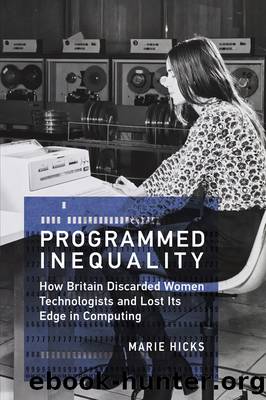Programmed Inequality: How Britain Discarded Women Technologists and Lost Its Edge in Computing by Mar Hicks

Author:Mar Hicks [Hicks, Marie]
Language: eng
Format: epub
Tags: employment; Great Britain; sex discrimination; feminism; technocracy; computer science
ISBN: 9780262035545
Publisher: The MIT Press
Published: 2017-03-02T00:00:00+00:00
4
The Rise of the Technocrat: How State Attempts to Centralize Power through Computing Went Astray, 1965â1969
Although growing computerization created an exciting and lucrative environment from the perspective of computer workers in the 1960s, the view from above was different. The fruits of Labourâs white hot technological revolution remained economically uncertain and difficult to quantify. First, vastly increased efficiency was not indicated by the governmentâs manpower studies on its own computing systems, but vast outlays on computing hardware and software continued apace.1 Second, growing labor problems plagued the government. Its installations required an ever-increasing number of skilled computer workers, but in a field with hazy qualifications and no set career path, hiring and retention on the scale needed was becoming difficult. Third, the British computing industry required ever-increasing injections of government funding to stay competitive, in the form of grants, loans, and preferential government purchasing policies for computers used in Civil Service offices and the nationalized industries.
This trifecta of computing problems played out against the backdrop of a protracted economic crisis during the mid- to late 1960s. Britainâs gross national product had increased only slowly from the 1950s on, far outpaced by the growth of the economies of its continental rivals. As former colonies and Commonwealth trading partners increasingly turned to the United States, Britainâs balance of payments suffered. Attempts to reverse the poor trading situation through technological modernization geared to increase production for both domestic and export markets could not produce a quick or dramatic enough change in Britainâs economic outlook, and by the summer of 1965 the economic crisis had sharpened enough to require a government pay freeze and an expenditure reduction policy that necessitated, among other measures, deferring computer purchasesâunless they effected major reductions in Civil Service labor costs.2
In November 1967, the pound had to be devalued against the dollar for the second time in under two decades, a move that failed to quell inflation or give British exports the necessary boost.3 The next year, in a scathing report on government inadequacies, the Fulton Committee took the Civil Serviceâs sprawling bureaucracy to task for amateurism, secrecy, classism, poor management, and wrongheaded organizational practices. In the midst of a nationwide modernization drive, the committee condemned the governmentâs own infrastructure for being mired in the past, emphasizing the need for more technically minded governance.4
An increasingly dissatisfied British labor force, stung by the economic situation, remained unconvinced by Wilsonâs reassurances that the âpound in their pocketsâ remained sound. In addition, the Britain of the âswinging sixtiesâ and early seventies was rife with sexual and racial discrimination, exacerbating the difficulties many workers faced as the nation was buffeted by economic problems.5 Workers took both official and unofficial measures to try to secure the ever-improving standards of living promised by Labourâs modernization program, and industrial action became increasingly common. Computer workers, despite being the vanguard of Britainâs new high-technology economy, were no exception. International Computers and Tabulators (ICT), the company heavily favored for government data-processing installations (the majority of government computers were ICT)
Download
This site does not store any files on its server. We only index and link to content provided by other sites. Please contact the content providers to delete copyright contents if any and email us, we'll remove relevant links or contents immediately.
| General | Men |
| Women in History |
Cecilia; Or, Memoirs of an Heiress — Volume 1 by Fanny Burney(32523)
Cecilia; Or, Memoirs of an Heiress — Volume 2 by Fanny Burney(31928)
Cecilia; Or, Memoirs of an Heiress — Volume 3 by Fanny Burney(31912)
The Great Music City by Andrea Baker(31893)
We're Going to Need More Wine by Gabrielle Union(19019)
All the Missing Girls by Megan Miranda(15878)
Pimp by Iceberg Slim(14461)
Bombshells: Glamour Girls of a Lifetime by Sullivan Steve(14036)
For the Love of Europe by Rick Steves(13791)
Talking to Strangers by Malcolm Gladwell(13327)
Norse Mythology by Gaiman Neil(13312)
Fifty Shades Freed by E L James(13214)
Mindhunter: Inside the FBI's Elite Serial Crime Unit by John E. Douglas & Mark Olshaker(9283)
Crazy Rich Asians by Kevin Kwan(9255)
The Lost Art of Listening by Michael P. Nichols(7475)
Enlightenment Now: The Case for Reason, Science, Humanism, and Progress by Steven Pinker(7287)
The Four Agreements by Don Miguel Ruiz(6725)
Bad Blood by John Carreyrou(6597)
Weapons of Math Destruction by Cathy O'Neil(6243)
